Polycystic Ovary Syndrome (PCOS) affects millions of women worldwide, leading to hormonal imbalances, weight challenges, and insulin resistance. Managing these symptoms starts with a carefully tailored diet. In this guide, we explore the best PCOS-friendly recipes and dietary strategies, packed with details to help you live your healthiest life.
Understanding PCOS Recipes and Its Dietary Needs
Polycystic Ovary Syndrome (PCOS) is a complex condition affecting millions of women worldwide. Understanding its root causes, symptoms, and dietary needs is essential to effectively manage its impact on overall health and well-being.
What is PCOS Recipes?
Polycystic Ovary Syndrome (PCOS) is a hormonal disorder that affects the way women’s ovaries function. It’s characterized by:
- Irregular menstrual cycles or missed periods.
- Excess androgen levels (male hormones) that can lead to acne, hair thinning, or excessive facial/body hair.
- Polycystic ovaries, where the ovaries become enlarged and contain small fluid-filled sacs (follicles).
Although the exact cause of PCOS remains unclear, it is often linked to insulin resistance, inflammation, and genetics. These factors can lead to hormonal imbalances, which disrupt ovulation and affect overall metabolic health.
Importance of Diet in Managing PCOS Recipes
A targeted diet is one of the most effective tools for managing PCOS symptoms. Since the condition is strongly tied to insulin resistance and inflammation, eating the right foods can significantly improve hormone regulation and reduce symptoms.
Benefits of a PCOS-Friendly Diet
- Blood Sugar Stabilization:
- Low-GI carbohydrates and high-fiber foods slow digestion, preventing blood sugar spikes.
- Balanced blood sugar reduces insulin resistance and improves energy levels.
- Hormonal Balance:
- Healthy fats, like those found in avocados and nuts, support the production of essential hormones.
- Lean protein helps repair tissues and maintains satiety, reducing cravings.
- Inflammation Reduction:
- Anti-inflammatory foods, such as leafy greens, fatty fish, and turmeric, combat oxidative stress that can worsen PCOS symptoms.
Without proper nutrition, PCOS symptoms can worsen, leading to long-term issues like type 2 diabetes, heart disease, or fertility challenges. Incorporating a nutrient-rich diet is a proactive step in managing these risks.
Common Symptoms and Their Impact on Nutrition
The symptoms of PCOS go beyond irregular periods and infertility, significantly affecting nutritional needs and overall health. Below are the most common symptoms and their dietary implications:
1. Insulin Resistance
- Impact: The body struggles to regulate blood sugar, leading to frequent spikes and crashes in energy levels.
- Dietary Focus: Include foods rich in fiber (e.g., vegetables, legumes) and low-GI carbs (e.g., quinoa, oats) to improve insulin sensitivity.
2. Weight Gain or Difficulty Losing Weight
- Impact: Hormonal imbalances make it harder to shed pounds, especially around the abdominal area (PCOS belly).
- Dietary Focus: Opt for high-protein meals and avoid refined carbs and sugary snacks.
3. Chronic Inflammation
- Impact: Inflammation exacerbates symptoms like fatigue, skin issues, and even mood swings.
- Dietary Focus: Consume anti-inflammatory foods, such as omega-3-rich salmon, olive oil, and antioxidant-packed berries.
4. Excess Androgens (Male Hormones)
- Impact: Leads to acne, hair loss, and unwanted hair growth (hirsutism).
- Dietary Focus: Incorporate zinc-rich foods like nuts and seeds, which help regulate androgen production.
5. Irregular Menstrual Cycles
- Impact: Hormonal imbalances disrupt ovulation, making it challenging to conceive.
- Dietary Focus: Include magnesium-rich foods, such as leafy greens and dark chocolate, to support reproductive health.
By understanding the root causes of PCOS and its symptoms, as well as the role of a balanced diet in alleviating them, you can take charge of your health. In the next sections, we’ll dive deeper into specific recipes, meal plans, and actionable tips tailored to managing PCOS effectively.
Why is a PCOS Recipes Diet Essential?
A well-planned diet is a cornerstone of managing PCOS effectively. The condition is often associated with insulin resistance and chronic inflammation, which can exacerbate symptoms like weight gain, fatigue, and irregular periods. Diets rich in low-GI foods, healthy fats, and lean protein can help regulate insulin levels, reduce inflammation, and improve hormonal balance.
The Role of Insulin and Inflammation
PCOS increases the body’s insulin production, making it harder to regulate blood sugar levels. This cycle leads to weight gain and heightened symptoms. Anti-inflammatory foods, such as fatty fish, nuts, and leafy greens, combat these effects by stabilizing blood sugar and reducing oxidative stress.
According to this detailed digital recipe guide, incorporating nutritious, whole foods into meal plans is essential for anyone managing hormonal conditions like PCOS.
Key Components of a PCOS Recipes Diet
Foods to Include
A PCOS-friendly diet is nutrient-dense, focusing on whole, unprocessed foods that support hormonal balance and insulin sensitivity. Consider including the following:
- High-Fiber Foods:
- Examples: Broccoli, kale, and Brussels sprouts.
- Benefits: Fiber slows digestion, keeping blood sugar levels stable and promoting satiety.
- Lean Proteins:
- Examples: Chicken breast, tofu, eggs, and fish.
- Benefits: Proteins help in muscle repair and provide long-lasting energy.
- Healthy Fats:
- Examples: Avocado, olive oil, and nuts.
- Benefits: Essential for hormonal production and reducing inflammation.
- Low-GI Carbohydrates:
- Examples: Sweet potatoes, whole grains, and quinoa.
- Benefits: Prevent spikes in blood sugar while providing steady energy.
- Anti-Inflammatory Ingredients:
- Examples: Turmeric, ginger, and cinnamon.
- Benefits: Reduce oxidative stress and inflammation.
Foods to Avoid
Eliminating certain foods is equally critical. These worsen insulin resistance and increase inflammation:
- Refined sugars and white bread.
- Processed snacks like chips and sugary cereals.
- Trans fats found in margarine and fried foods.
Learn more about anti-inflammatory options with this immunity-boosting guide.
PCOS Recipes to Support Your Health
Cooking at home allows you to control the ingredients and create balanced meals tailored to your needs. Below are detailed recipe ideas for every meal of the day.
Breakfast PCOS Recipes
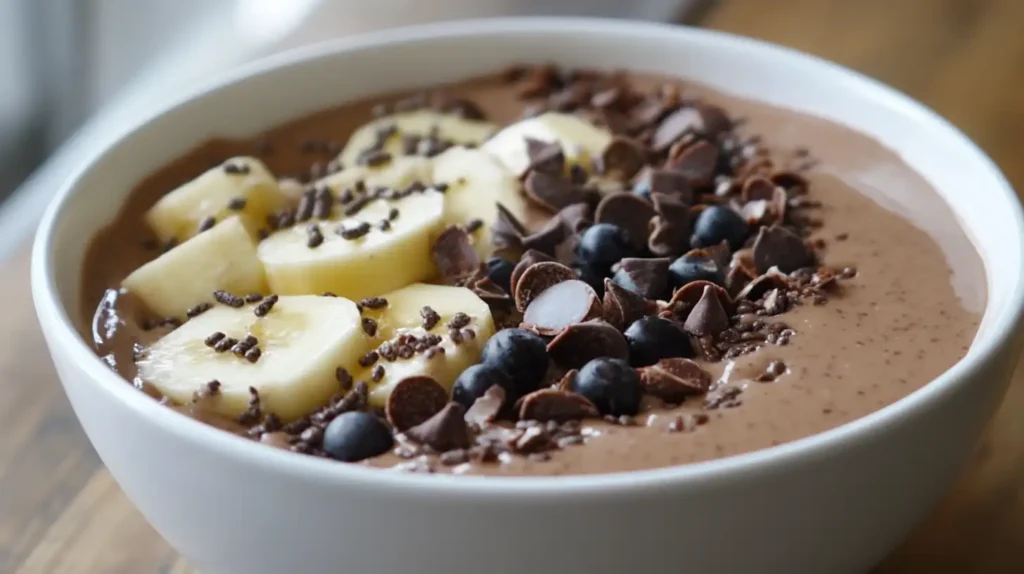
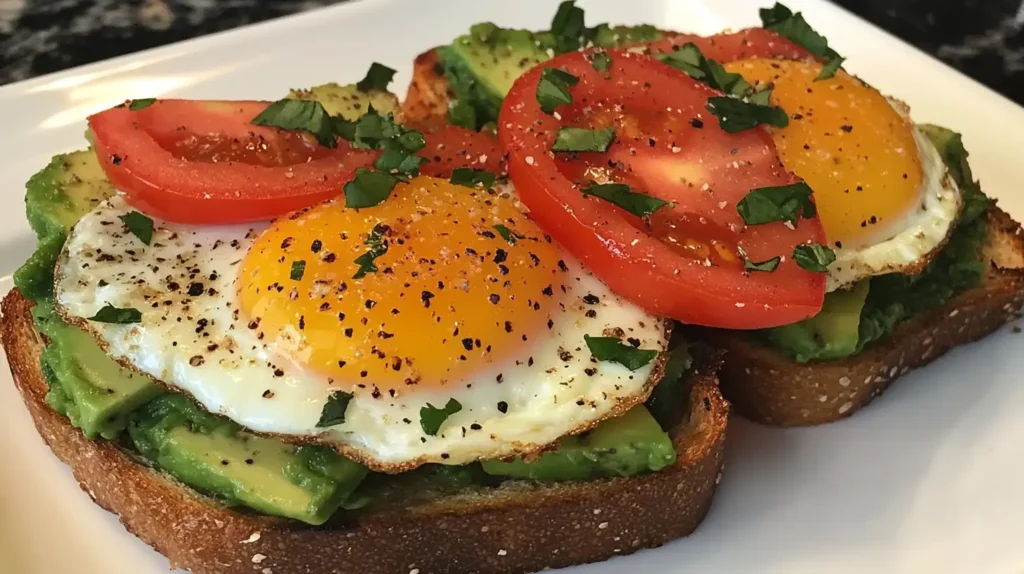
- Low-GI Smoothie Bowl
- Ingredients: Almond milk, frozen berries, chia seeds, spinach, and a spoonful of almond butter.
- Why It’s Great: High in antioxidants, fiber, and healthy fats, this smoothie bowl keeps you full and energized.
- Pro Tip: Add a sprinkle of cinnamon for extra anti-inflammatory benefits.
- Egg and Avocado Toast
- Ingredients: Whole-grain bread, two poached eggs, half an avocado, and a dash of flaxseeds.
- Why It’s Great: This protein-packed breakfast stabilizes blood sugar and provides essential nutrients.
Lunch PCOS Recipes
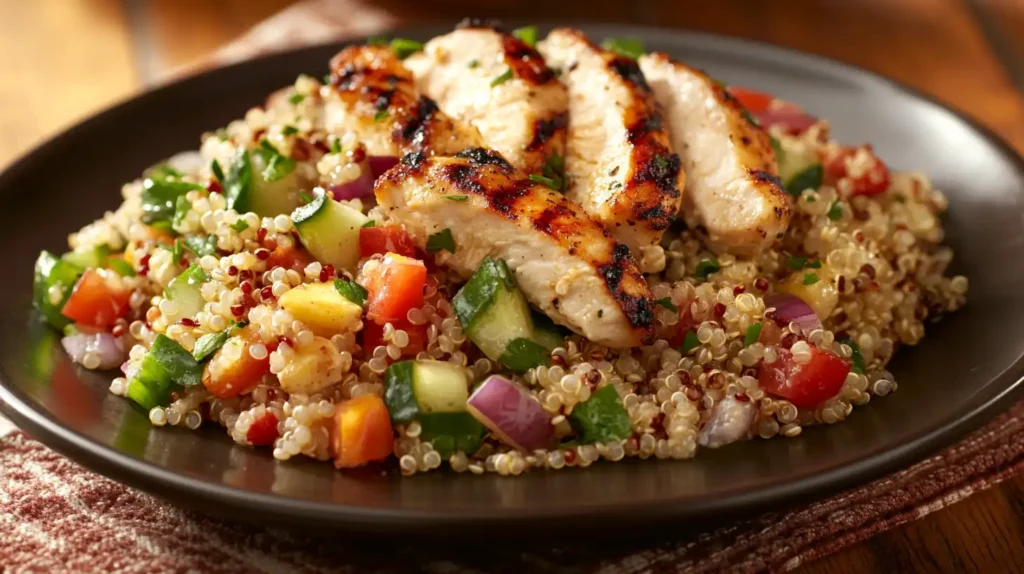
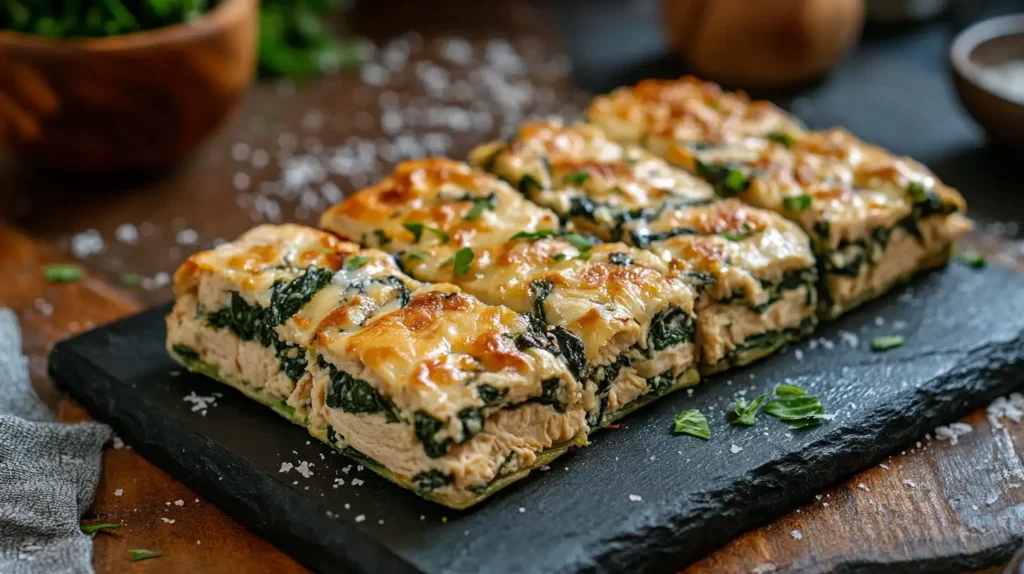
- Quinoa Salad with Grilled Chicken
- Ingredients: Quinoa, spinach, grilled chicken, cucumbers, and a light olive oil dressing.
- Benefits: A combination of fiber, lean protein, and healthy fats to fuel your day.
- Learn variations of high-protein lunch bowls roam diet recipes.
- Turkey and Spinach Wraps
- Ingredients: Whole-grain wraps, lean turkey slices, fresh spinach, and a dollop of hummus.
- Why It’s Great: Low in carbs and rich in nutrients, these wraps are a perfect midday meal.
Dinner PCOS Recipes
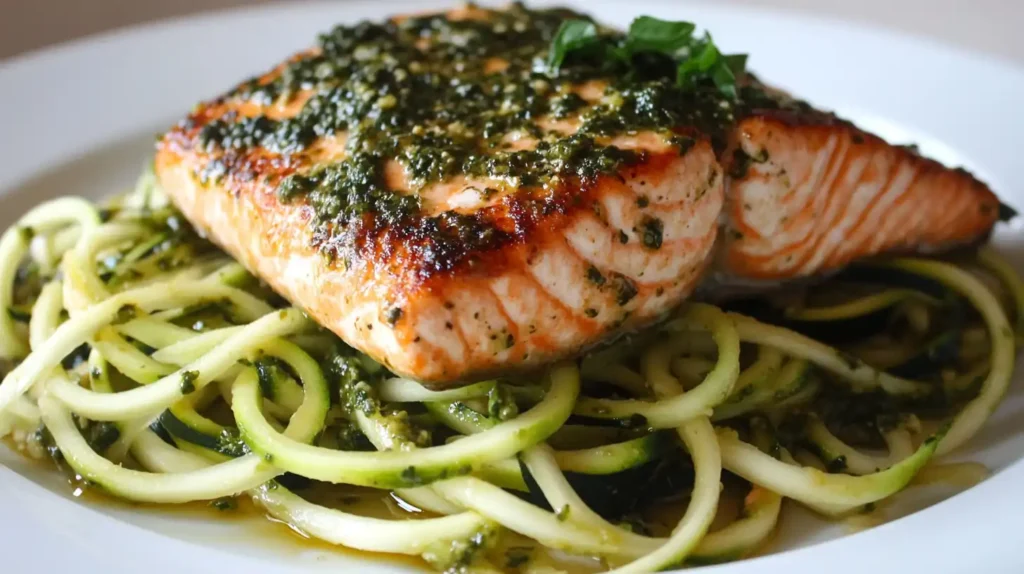
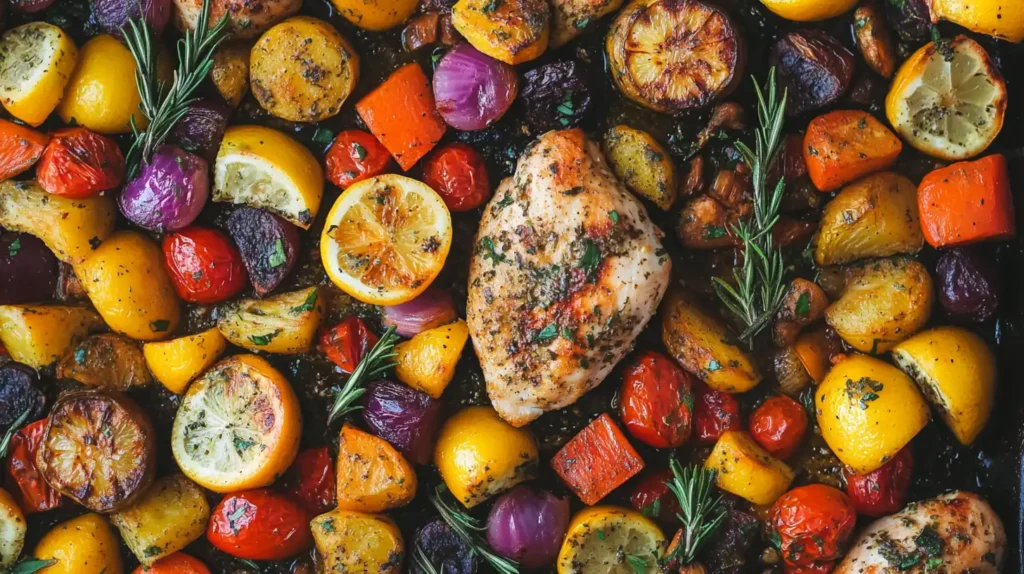
- Zucchini Noodles with Pesto and Grilled Salmon
- Ingredients: Spiralized zucchini, homemade basil pesto, grilled salmon fillets, and cherry tomatoes.
- Why It’s Great: A delicious, low-carb option rich in omega-3 fatty acids to reduce inflammation.
- Sheet-Pan Lemon Herb Chicken with Veggies
- Ingredients: Chicken thighs, carrots, bell peppers, and zucchini seasoned with rosemary and lemon.
- Why It’s Great: This easy one-pan dish balances protein and vegetables perfectly.
Snacks and Desserts for PCOS Recipes
Snacks
- DIY Trail Mix
- Ingredients: Almonds, walnuts, pumpkin seeds, and a few dark chocolate chips.
- Why It’s Great: A quick, nutrient-dense snack that satisfies cravings and provides energy.
- Veggie Sticks with Hummus
- Why It’s Great: A great way to incorporate fiber and protein between meals.
Desserts
- Dark Chocolate Avocado Mousse
- Ingredients: Avocado, unsweetened cocoa powder, almond milk, and stevia.
- Why It’s Great: A decadent yet healthy dessert option.
- Explore more dessert recipes like banana bread variations.
- Almond Flour Cookies
- Ingredients: Almond flour, coconut oil, and a sugar substitute.
- Why It’s Great: These cookies are gluten-free, low-carb, and satisfy sweet cravings without derailing your diet.
Personalizing Your PCOS Recipes Diet
Adapting recipes to suit your taste and lifestyle is crucial for long-term success. Consider these tips:
- Substitute Ingredients: Use almond flour or coconut flour in place of regular flour for lower carb content.
- Incorporate Spices: Add turmeric or cinnamon to dishes for their anti-inflammatory properties.
- Portion Control: Balance meals with equal parts protein, healthy fats, and low-GI carbs to prevent overeating.
FAQs for PCOS Recipes
What is the best meal plan for PCOS?
A well-balanced PCOS Recipes meal plan focuses on whole foods, lean proteins, healthy fats, and low-GI carbohydrates. Aim for meals that stabilize blood sugar levels and reduce inflammation. A sample day could include:
- Breakfast: Avocado toast with a boiled egg.
- Lunch: Grilled chicken quinoa salad with mixed greens.
- Snack: A handful of nuts with a few dark chocolate chips.
- Dinner: Zucchini noodles with pesto and baked salmon.
Avoid processed foods, refined sugars, and high-GI carbs for best results.
How much protein do you need a day with PCOS Recipes?
For individuals with PCOS, the recommended protein intake ranges between 0.8 to 1.2 grams per kilogram of body weight daily. For example:
- A person weighing 70 kg (154 lbs) would require approximately 56–84 grams of protein per day. Protein is essential for managing blood sugar levels and improving satiety. Lean sources like chicken, tofu, eggs, and legumes are ideal.
What does a PCOS Recipes diet look like?
A PCOS Recipes diet emphasizes:
- Proteins: Chicken, fish, tofu, and eggs.
- Low-GI Carbs: Sweet potatoes, quinoa, and whole grains.
- Healthy Fats: Avocados, olive oil, and nuts.
- Vegetables: Leafy greens, broccoli, and cauliflower.
Meals are designed to reduce inflammation, stabilize blood sugar, and promote hormonal balance. Avoid sugary drinks, refined carbs, and trans fats.
Can I eat eggs in PCOS Recipes?
Yes, eggs are an excellent choice for a PCOS Recipes diet. They are:
- High in protein to stabilize blood sugar.
- Rich in healthy fats, vitamins, and minerals like biotin and selenium.
Eggs can be included in breakfasts (e.g., boiled or scrambled) or snacks, providing a filling and nutrient-rich option.
What is a PCOS belly?
A PCOS belly refers to the abdominal weight gain commonly seen in individuals with PCOS. This occurs due to:
- Insulin resistance, which encourages fat storage around the midsection.
- Hormonal imbalances that alter how the body processes fat.
Targeting insulin resistance through a low-GI, high-protein diet combined with exercise can help reduce belly fat over time.
What not to eat in PCOS Recipes?
Avoid foods that exacerbate insulin resistance and increase inflammation, including:
Trans Fats: Found in margarine and fried foods.
These foods can worsen symptoms and disrupt hormonal balance, so it’s best to limit or eliminate them from your diet.
Refined Sugars: Pastries, candies, and sweetened drinks.
High-GI Carbs: White bread, rice, and pasta.
Processed Foods: Chips, packaged snacks, and fast food.
Conclusion
Living with PCOS doesn’t mean giving up delicious meals. With these PCOS-friendly recipes, you can manage symptoms while enjoying nutrient-rich, satisfying food. Start by experimenting with these ideas and take advantage of meal planning to make healthy eating a sustainable part of your life. For more recipe inspiration, check out sourdough breakfast options that incorporate natural probiotics and fiber.
Take control of your diet today and make every meal a step toward better health!

